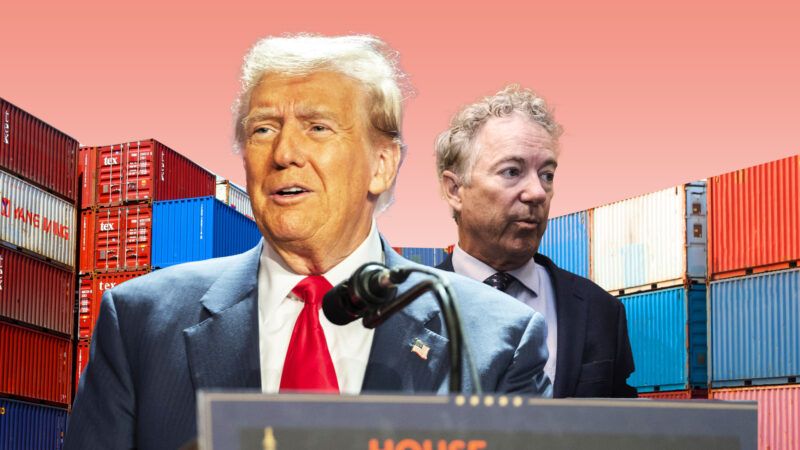The Last Chance To Curtail Trump's Tariff Powers?
Sen. Rand Paul's bill to require congressional consent for tariffs is getting new attention in the final weeks before Trump's return to power.

President-elect Donald Trump has promised to impose huge new tariffs on goods imported into the United States, a tax increase that could cost Americans hundreds of billions of dollars annually.
Unless Congress acts soon, Trump might be able to do it all without a single vote by the country's elected representatives.
Opponents of Trump's tariff plans—including business groups and trade associations whose members would be hit with those higher costs—are eyeing the upcoming lame-duck session of Congress as possibly the last, best hope of yanking some tariff powers back from the chief executive. With a small Democratic majority in the Senate and President Joe Biden in the White House until January, there is at least a slim hope that lawmakers could restore some of the balance of power over trade policy.
"President-elect Trump's aggressive tariff proposals, including across-the-board tariff increases on our closest allies, will have significant economic and foreign policy consequences, including higher prices for consumers and businesses, potential trade wars, and disruptions to supply chains," Ed Brzytwa, vice president of international trade for the Consumer Technology Association (CTA), told Reason via email. Previously, the CTA estimated that Trump's tariffs could add as much as 40 percent to the sticker price for gaming consoles and also increase the price of items like smartphones, laptops, and televisions.
"To prevent these outcomes, the Congress should immediately consider and pass the No Taxation Without Representation Act," Brzytwa wrote.
That bill, authored by Sen. Rand Paul (R–Ky.), would require congressional consent before a president could impose new tariffs. When he introduced the bill in September, Paul said it would restore "a core principle of American governance" by ensuring Congress approved new taxes.
"Unchecked executive actions enacting tariffs tax our citizens, threaten our economy, raise prices for everyday goods, and erode the system of checks and balances that our founders so carefully crafted," Paul said in a statement.
In addition to restoring a balance of power over trade policy, advocates of the measure say it would promote economic stability by preventing abrupt swings in tariffs based on the president's whims.
Bryan Riley, director of the free trade project at the National Taxpayers Union Foundation, a nonprofit that opposes tariffs, calls Paul's proposal "the most important bill" that Congress could consider during the lame-duck session. It may seem unlikely that the Republican majority in the House would embrace a proposal to limit Trump's trade powers, but Riley argues that failing to do so could be a shortsighted mistake.
"Today, 81 of the top 100 agricultural-producing congressional districts are represented by Republicans," he writes. "Many of these representatives have been working to pass a farm bill. The benefits of a new farm bill are negligible compared to the potential cost of a new trade war."
Indeed, the costs of Trump's trade policies fell directly on American farmers during his first term, as tariffs raised the price of farm equipment and other necessary goods and retaliation from other countries hurt agricultural exports. Trump eased some of that pain by having taxpayers bail out farmers, but lawmakers have inserted a provision into this year's farm bill to prohibit another bailout.
If Congress does not block Trump's tariffs, there's also a chance the courts could get involved. Jennifer Hillman, a professor at Georgetown Law Center, tells NBC News that it could be "problematic" for Trump to impose sweeping tariffs on all imports without congressional authorization because most of the laws delegating those powers to the executive require more specific actions tied to certain products or imports from certain countries.
Some recent Supreme Court rulings that embraced the "major questions doctrine"—a constitutional law theory that says Congress must explicitly authorize executive branch actions on issues that have vast "economic and political significance"—could also be a factor. That theory was at the center of the Supreme Court's decisions that blocked Biden's student loan forgiveness scheme and put an end to Chevron deference. It could prove to be a stumbling block for Trump's tariffs too.
Still, it would be better for Congress to take a proactive role rather than waiting for the courts to intervene. The Constitution and common sense say that the executive branch should not be able to impose a huge tax increase on American consumers and businesses without the consent of Congress. The next few weeks might be the last chance to ensure that's still true.


Show Comments (42)